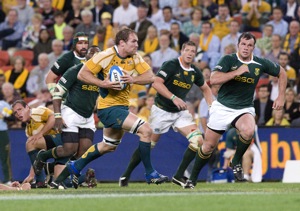Expert

Australian player Rocky Elsom makes a break during the Tri-Nations match between the Australian Wallabies and the South African Springboks at Suncorp Stadium in Brisbane, Saturday, Sept. 5, 2009. AAP Image/Dave Hunt
The stirring, rousing Wallabies victory over the Springboks 21 – 6, which had the excited 47,000 crowd at Brisbane chanting ‘Wallabies! Wall -a-bies!’ with each frenetic phase of play, was the victory that had to be achieved.
A new generation of Wallabies, with the best of the old-timers, showed promise of being a competitive side leading into the 2011 Rugby World Cup.
I liken it to the victory by the Wallabies in the third Test against the All Blacks at Wellington in 1990, and the last-gasp penalty kick victory at Raustenburg by the Springboks against the All Blacks in 2006. Both the winning sides had to have a victory to stop a long losing sequence or else suffer the axing of all the senior players.
It’s history now that the embattled Wallabies and the Springboks went on to win their RWC tournaments in 1991 and 2007.
The analogy is not entirely four-square. The side that Robbie Deans (and where are the criticisms now of him as a coach?) sent out had actually been culled, one way or another, of senior players who are past it. No Al Baxter, no Nathan Sharpe, no Lote Tuqiri, no Phil Waugh, and no Stirling Morlock.
The pack without Baxter and Sharpe scrummed very well and once again exposed the liability of playing John Smit for his captaincy, even though his prop play is weak. Will Genia playing his first run-on Test fitted in like a young George Gregan. If he continues his improvement he will be a long-term halfback in the quick-passing, strong running tradition set by John Hipwell, of blessed memory, who handed out the team jerseys.
For the Springboks, it was a case of sow a wind and reap a whirlwind. Before the Tri-Nations tournament I wrote a piece suggesting that ‘arrogance’ might derail the winning chances of a very good side. That arrogance was expressed in wearing armbands ‘Justice4Bakkies’ in protest of a judicial finding by an IRB committee against the Bakkies Botha for reckless play leading to the injury of a British and Lions prop, Adam Jones.
The arrogance continued when the Springboks scrum was over-powered and (rightly penalised) at Perth and a ‘please explain’ letter was sent to the IRB in complaint of the NZ refereee Bryce Lawrence. The IRB, through its referees manager Paddy O’Brien, another New Zealander, said that the scrum penalties were correct and that Lawrence was the most accurate scrum referee going around.
Now fast-forward to just before the Brisbane Test. Smit is being interviewed. He is asked about the scrums, and here is his incredibly arrogant answer: ‘I hope the referee is more accurate tonight than last week’s referee.’
This arrogant refusal by the Springboks and their management to acknowledge that that their players have infringed, even when it is made clear to them by the IRB, came back to bite them in the 32nd minute of the Brisbane Test when Brett Robinson pulversied Smit in a crucial scrum and won a vital penalty. Throughout the Test the Wallaby scrum had the total measure of the Springboks scrum.
It was noticeable after the Test that Peter de Villiers finally conceded that the Springboks scrum coaches will have to look at what they’ve been telling the players because yet another referee, this time the Englishman Wayne Barnes, found faults with their methods.
Aside from the victory itself, the best aspect of the Wallabies win was the manner in which it was achieved. It was a victory built on the good things the Wallabies did, rather than on the mistakes made by the Springboks. It was an victory that featured lively and enterprising play rather than adopting the ‘win ugly’ approach the NSW Waratahs embraced in their ill-conceived Super Rugby campaign this year.
The youngest players in the sides, Tatafu Polata-Nau and David Pock in the forwards, and Will Genia and James O’Connor in the backs contributed heavily to the victory. The average age of the forwards is 26, the average age of the back is 23, apparently. This is a team with lots of growth in it and a high degree of skills and flair.
The Springboks now go to Hamilton to play the All Blacks in search of a win or a bonus point loss that will virtually assure them of the 2009 Tri-Nations. The referee is the Welshman Nigel Owens who could be in for a testing time. My guess is (and I hope I’m wrong) that the Springboks will give away their experiment of trying to play more with the ball in hand. We’ll see a return to the ‘win-ugly’ style of incessant kicking and the leash will removed on Botha to throw himself (literally) into the rucks and mauls.
As for the Wallabies, they have two weeks to prepare for their final Tri-Nations Test in 2009 at Wellington against the All Blacks. The challenge now is to record a rare victory in New Zealand in the same enterprising manner as that achieved at Brisbane.
The goal now must be a winning momentum rather than the occasional brilliant flash in the pan victory.